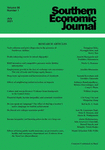Income inequality and housing prices in the very long-run
We examine the relationship between income inequality and house prices for a panel of 17 OECD countries over the period 1870 to 2015. Our identification strategy takes advantage of exogenous variation in culturally weighted communist influence to instrument for within-country variations in income inequality. Controlling for endogeneity, time, and country fixed effects, our results suggest that an increase in income inequality has a significant negative effect on real house prices. This finding is robust to the use of both the Gini coefficient and top income share as measures of income inequality and the use of absolute and relative income inequality measures, as well as a range of other robustness checks. We examine crime as a mechanism through which income inequality influences housing prices and find that the theft rate is a channel via which higher income inequality contributes to lower house prices.




